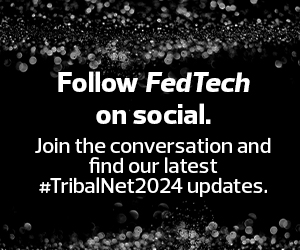“Data is the new land,” Mridula Rahmsdorf, chief revenue officer for IKASI, said at a Wednesday session. “We have to own it, we have to protect it, we have to grow it, we have to take care of it.”
As AI becomes more prevalent, protecting data sovereignty will require policies and controls that govern data management.
Healthcare Use Cases in the Spotlight
The Indian Health Service is nearly finished creating its AI policies but has not yet operationalized AI in any production environments, IHS CISO Benjamin Koshy said.
“The first AI that we will probably allow for use is Microsoft Copilot because that’s already been vetted and FedRAMP approved and it’s more contained, so our leveraging it presents less likelihood of unauthorized access outside of the government,” Koshy said.
Using AI to enhance cybersecurity within IHS is also an area of interest for Koshy.
“We’re researching how AI can look at a bunch of system logs and then prioritize them so that analysts can better dedicate their time to issues of higher importance,” he said. “Once we’ve grown confidence in its use, we might have a more automated response to certain types of security incidents that are currently manual processes.”
DISCOVER: Federal IT leaders discuss use cases for artificial intelligence implementation.
Some tribal health care providers have already implemented AI solutions. The Reno-Sparks Tribal Health Center, for instance, uses AI to automate medical charting, allowing healthcare workers to focus on patients.
“It has totally transformed the way I engage with patients,” Andrew Bader, chiropractic physician and certified physician assistant at Reno-Sparks, said. “It’s freed up time for me to consult with other providers; put in orders to pharmacies, for X-rays and for referrals; and has taken away that burden of charting.”
Other potential use cases for AI in healthcare are more forward-looking.
“It can do tribal-based genetic disease detection,” Rahmsdorf said. She offered the example of how a gene common in people of Asian descent can render them unable to digest alcohol. “A lot of Native American tribes may have unique genetic issues that have not even been explored yet,” she said.
Greater Tribal IT Representation Is Key to AI Oversight
The lack of Native American representation in the tech sector has been another important talking point at TribalNet.
In some ways, AI can be a boon to workforces. For instance, automated medical charting has demonstrated clear benefits to providers, potentially assisting in job satisfaction, which can go a long way toward filling physician vacancies in rural areas.
At the same time, maintaining indigenous data sovereignty as more tribes and tribal organizations move to cloud environments and explore AI use cases will require additional data management expertise.
READ MORE: Boosting Native representation in IT benefits tribes.
This data management expertise can and should come from tribal communities, experts at TribalNet said.
“We have to get more kids from tribal country into data science,” Rahmsdorf said. “I do believe, with the talent that we have in native communities, that they can be leaders in data management.”
To learn more about TribalNet, visit our conference page. You can also follow us on the social platform X at @FedTechMagazine to see behind-the-scenes moments.














